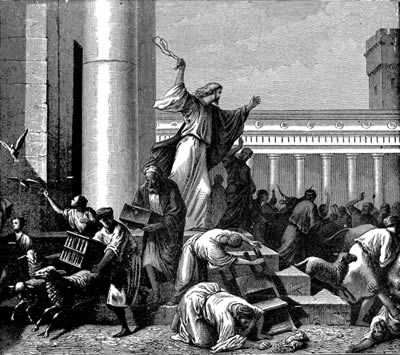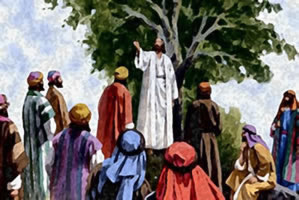Jesus the Prophet

by Dennis Pollock
In Christian circles we occasionally hear the phrase “the five-fold ministry.” This concept comes from Paul’s letter to the Ephesians where he states that God has given to the church apostles, prophets, evangelists, pastors, and teachers. These represent five major categories of ministry grace given to men and women. Each involves a unique set of gifts, emphasis, and spiritual instincts, and each is a blessing to the elect of God.
Because Jesus was God manifested in human form, He functioned in all the ministry gifts and moved easily from one to another as the situation dictated. He could be pastoral and incredibly encouraging, and yet at times His eyes could blaze with holy prophetic passion and even anger. As an evangelist He was at home eating with sinners and sharing God’s love with them, but He loved the company of devout men and women as well. In this devotional study we shall consider Jesus the prophet.
As a prophet Jesus was sharing in a time-honored tradition among the people of Israel. As long as there had been an Israel there were prophets to bring correction and warning to God’s people. They offered encouraging glimpses of future glory for Israel, but they could also proclaim judgment and fearful times for the nation, when they were living contrary to the will and purpose of God. Prophets were usually on the severe side, and were often not much appreciated until after they were dead. Eventually Israel came to realize that a prophet had been among them, and would then accord him the honor and reverence he rarely or never had when he was alive.
Prophets were all about morality. Religious traditions meant nothing, if the people were not actually living in righteousness, and showing compassion and concern for the poor and the weak. We see an excellent example of this in the seventh chapter of Jeremiah, where he is instructed to go to the temple, the pride of all Israel, and tell them these words:
“Do not trust in these lying words, saying, ‘The temple of the LORD, the temple of the LORD, the temple of the LORD are these. For if you thoroughly amend your ways and your doings, if you thoroughly execute judgment between a man and his neighbor, if you do not oppress the stranger, the fatherless, and the widow, and do not shed innocent blood in this place, or walk after other gods to your hurt, then I will cause you to dwell in this place…” (Jeremiah 7:2-7)
This is classical prophetic ministry. Jeremiah is demolishing the religious pride of the Jews by insisting that all their delight in the “temple of the Lord” is meaningless unless it is accompanied by moral reform and righteous behavior. To be such a spokesman for God, these prophets had to have grit in their souls. These men were not the types to stroke people’s egos, nor did they worry overmuch about hurting their listeners’ self-esteem. Their temperaments seemed to contain an extra dose of fearlessness, which others lacked. They were often killed for this very attribute, but they could no more help being what they were and speaking what they spoke, than a bird could help chirping or a lion roaring.
Do we see any of these characteristics in the Lord Jesus, as we read of Him in the gospels? We certainly do. Our Lord could be incredibly encouraging, but He could also be forceful, blunt, and direct. Those same eyes that exuded compassion could blaze with holy outrage. He once He told His disciples, “The world cannot hate you, but Me it hates, because I testify of it, that its deeds are evil.” Forcefully proclaiming the wickedness of one’s nation and generation is classic prophetic ministry – you might say it is a major component of the “job description” of the prophet. Perhaps the disciples were wanting a little too much to gain favor with all the people, but Jesus never suffered from that weakness. When asked for a sign to confirm His teachings and His ministry, He replied, “A wicked and adulterous generation seeks after a sign, and no sign shall be given to it except the sign of the prophet Jonah,” not a particularly seeker-sensitive thing to say!
Jesus not only spoke prophetically; He sometimes quoted the prophets, using their exact words to speak to the people of His day. Quoting Isaiah, He declared: “And in them the prophecy of Isaiah is fulfilled, which says: ‘Hearing you will hear and shall not understand, and seeing you will see and not perceive.’ ” Another time He was even tougher, saying, “Hypocrites! Well did Isaiah prophesy about you, saying: ‘These people draw near to Me with their mouth, and honor Me with their lips, but their heart is far from Me…’ ”
Comfort and Encouragement
But the prophets did far more than criticize and condemn. They could also speak powerful, anointed words of comfort, and they could wax eloquent about a glorious future for Israel, often immediately after letting loose a torrent of biting criticism. Their encouragements and promises of future glory and the ultimate exaltation of Israel seemed strangely incongruent with their rebukes and criticisms, but both elements were present in nearly every prophet. The same Isaiah who scathingly wrote: “Alas, sinful nation, a people laden with iniquity, a brood of evildoers…” could also tenderly promise: “Comfort, yes, comfort My people!” says your God. Speak comfort to Jerusalem, and cry out to her, that her warfare is ended, that her iniquity is pardoned…”
And this was true of the Lord Jesus as well. The same Jesus who could blast Israel’s religious leaders as hypocrites, snakes, and fools could also speak gentle words of encouragement about a Heavenly Father who loves us, and is eager to provide for all our needs. More than that, he spoke of a place called heaven where sorrow and suffering would not exist. Some of Jesus’ encouraging promises include:
- “Look at the birds of the air, for they neither sow nor reap nor gather into barns; yet your heavenly Father feeds them. Are you not of more value than they?”
- “I am the living bread which came down from heaven. If anyone eats of this bread, he will live forever.”
- “Rejoice in that day and leap for joy! For indeed your reward is great in heaven…”
In ministering the way He did, Jesus was following in the footsteps of the many prophets who had gone before Him. However, being the perfect expression of God, He was doing it far better than anyone else had ever done. And like the prophets of old, He was rejected by some who became His bitter enemies, yet appreciated and respected by others.
The Time of the End
 Another feature of the prophets was their strange fixation with the end of the current age and their declaration of a new age which would be unlike anything the earth has ever seen. Here again their prophecies seemed a bit schizophrenic, as they sometimes spoke of terrible times of destruction and misery, and other times optimistically prophesied of a time of unparalleled prosperity, peace, righteousness, and joy. On the negative side, we read such things as:
Another feature of the prophets was their strange fixation with the end of the current age and their declaration of a new age which would be unlike anything the earth has ever seen. Here again their prophecies seemed a bit schizophrenic, as they sometimes spoke of terrible times of destruction and misery, and other times optimistically prophesied of a time of unparalleled prosperity, peace, righteousness, and joy. On the negative side, we read such things as:
- The earth is violently broken, the earth is split open; the earth is shaken exceedingly. The earth shall reel to and fro like a drunkard, and shall totter like a hut… (Isaiah 24:19)
- Blood and fire and pillars of smoke. The sun shall be turned into darkness, and the moon into blood, before the coming of the great and awesome day of the LORD. (Joel 2:30, 31)
But in a far more positive vein, Isaiah promises: “Now it shall come to pass in the latter days that the mountain of the LORD’s house shall be established on the top of the mountains, and shall be exalted above the hills; and all nations shall flow to it” (Isaiah 24…), and Joel declares, “Then Jerusalem shall be holy, and no aliens shall ever pass through her again. And it will come to pass in that day that the mountains shall drip with new wine, the hills shall flow with milk…” (Joel 3:17, 18).
As with the prophets before Him, Jesus was unafraid and unashamed to speak plainly and forcefully on the subject of the end of this age, and the age which would follow. Some well-meaning folks who love to keep everything on a positive note, are sharply critical of people who speak of anything negative or talk of God’s judgment and wrath that will precede the return of Jesus. They call such talk “gloom and doom” preaching. These people imply that anyone who presents such a scenario is carnal, stupid, fanatical, unspiritual, legalistic, and has totally missed the point of the Scriptures, which is surely that God thinks we are all wonderful and He wouldn’t harm a flea!
Yet when we read the words of our Lord Jesus as He speaks about the end of the age, we can’t help but see (if we have removed our rose-colored glasses) that Jesus Himself spoke of things getting pretty rough. He tells us:
- “For then there will be great tribulation, such as has not been since the beginning of the world until this time, no, nor ever shall be. And unless those days were shortened, no flesh would be saved…” (Matthew 24:21, 22)
- “And there will be signs in the sun, in the moon, and in the stars; and on the earth distress of nations, with perplexity, the sea and the waves roaring; men’s hearts failing them from fear and the expectation of those things which are coming on the earth…” (Luke 21:25, 26)
As you can see, Jesus could speak with toughness and preach “doom and gloom” with the best of them. But like all good prophets He also spoke of an ultimately blessed and happy conclusion for those who cling to Him and walk uprightly, declaring: “Watch therefore, and pray always that you may be counted worthy to escape all these things that will come to pass, and to stand before the Son of Man” (Luke 21:36).
Ultimate Prophet
 Behold, Jesus the Prophet – the ultimate prophet, the prophet’s prophet, the Prophet who spoke like no other prophet had ever spoken. When He came into Jerusalem that last time, there was such a commotion from the crowd, that some had to ask, “Who is this?” The multitudes of praisers got it right, telling them, “This is Jesus, the prophet from Nazareth of Galilee.” Of course Jesus was not merely a prophet – as the Muslims would suggest. He was also the greatest evangelist the world has ever seen, the most compassionate pastor in the history of mankind, and the ultimate Teacher. In Jesus we see all God’s ministry gifts wrapped up in One Person, the One who was prophesied to be our great Immanuel – God with us. When we see Jesus we see God, for John tells us that He is the One who is the Word, who was with God in the beginning, and who was and is God.
Behold, Jesus the Prophet – the ultimate prophet, the prophet’s prophet, the Prophet who spoke like no other prophet had ever spoken. When He came into Jerusalem that last time, there was such a commotion from the crowd, that some had to ask, “Who is this?” The multitudes of praisers got it right, telling them, “This is Jesus, the prophet from Nazareth of Galilee.” Of course Jesus was not merely a prophet – as the Muslims would suggest. He was also the greatest evangelist the world has ever seen, the most compassionate pastor in the history of mankind, and the ultimate Teacher. In Jesus we see all God’s ministry gifts wrapped up in One Person, the One who was prophesied to be our great Immanuel – God with us. When we see Jesus we see God, for John tells us that He is the One who is the Word, who was with God in the beginning, and who was and is God.
Christ in Us
The prophetic nature and gifting of the Lord Jesus has a couple of implications for our own lives. First, the more accurate our perception of Jesus, the keener our insight into the nature of God. Those who worship God must worship Him not only in Spirit, but also in truth. God is a prophetic God, and Jesus is a prophetic Jesus. If we become such spiritual namby-pambies that we cannot bear to hear even the slightest talk of judgment or of God’s disapproval of sinful behavior, or a final season of reckoning, we will always have a flawed, faulty, and incomplete view of both God and Christ.
Second, as the disciples of Jesus, we are called to be His ambassadors and to serve as His mouthpiece in the world. And as we abide in Jesus and He abides in us, His nature, His Spirit, and His perspectives should and will be revealed in us. We will begin to possess at least a little bit of His prophetic gift. Like our Master, we, too, will begin to speak out on the moral issues of our day. We too will proclaim the end of the age and the return of Jesus Christ. As with Jesus, there will be both toughness and tenderness in our speech, our writings, our sermons, our teachings, and our conversations. The Bible tells us that “the testimony of Jesus is the spirit of prophecy.” Let us go forth into this world with the prophetic boldness of our Savior, unafraid to declare that our present world has a divine expiration date stamped on it. Let us announce unashamedly that Jesus Christ will return to this earth. He said He would, and He always keeps His word.
![]()
To see a full listing of all articles available, go to our Written Devos Page.
For a full listing of all articles as audio mp3
files (free downloads), go to our Audio Devos Page.
For inspirational devos, bios of Christian leaders, free downloads, and the latest SOGM news:
Your donations are needed and greatly appreciated!

















